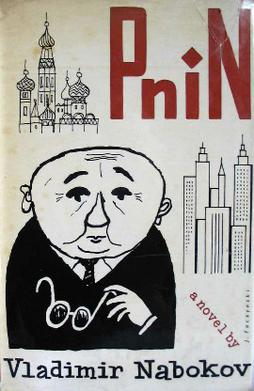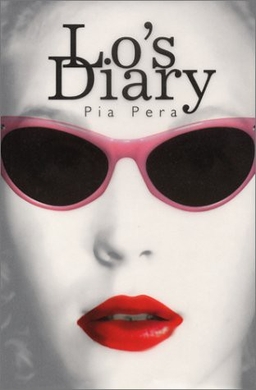
Edward Franklin Albee III was an American playwright known for works such as The Zoo Story (1958), The Sandbox (1959), Who's Afraid of Virginia Woolf? (1962), A Delicate Balance (1966), and Three Tall Women (1994). Some critics have argued that some of his work constitutes an American variant of what Martin Esslin identified and named the Theater of the Absurd. Three of his plays won the Pulitzer Prize for Drama, and two of his other works won the Tony Award for Best Play.

Frank A. Langella Jr. is an American actor known for his commanding roles on stage and screen. Langella eschewed the career of a traditional film star by always making the stage the focal point of his career, appearing on Broadway. He's received numerous accolades including four Tony Awards, a Drama Desk Award and a Screen Actors Guild Award as well as nominations for an Academy Award, a BAFTA Award, a Emmy Award, and two Golden Globe Awards,

Pnin is Vladimir Nabokov's 13th novel and his fourth written in English; it was published in 1957. The success of Pnin in the United States launched Nabokov's career into literary prominence. Its eponymous protagonist, Timofey Pavlovich Pnin, is a Russian-born assistant professor in his 50s living in the United States, whose character is believed to be based partially on the life of both Nabokov's colleague Marc Szeftel as well as on Nabokov himself. Exiled by the Russian Revolution and what he calls the "Hitler war", Pnin teaches Russian at the fictional Waindell College, loosely inspired by Cornell University and Wellesley College—places where Nabokov himself taught.

Ian William Richardson was a Scottish actor.

Lolita is a 1962 psychological comedy-drama film directed by Stanley Kubrick and based on the 1955 novel of the same title by Vladimir Nabokov, who is also credited with writing the screenplay. The film follows Humbert Humbert, a middle-aged literature lecturer who becomes sexually infatuated with Dolores Haze, a young adolescent girl. It stars James Mason, Shelley Winters, Peter Sellers and, as the titular character, Sue Lyon.

Lolita is a 1997 drama film directed by Adrian Lyne and written by Stephen Schiff. It is the second screen adaptation of Vladimir Nabokov's 1955 novel of the same name and stars Jeremy Irons as Humbert Humbert and Dominique Swain as Dolores "Lolita" Haze, with supporting roles by Melanie Griffith as Charlotte Haze, and Frank Langella as Clare Quilty. The film is about a middle-aged male professor named Humbert who rents a room in the house of the widow Charlotte Haze and becomes sexually attracted to her adolescent daughter Dolores, also called "Lo" or "Lolita".

Despair is the seventh novel by Vladimir Nabokov, originally published in Russian, serially in the politicized literary journal Sovremennye zapiski during 1934. It was then published as a book in 1936, and translated to English by the author in 1937. Most copies of the 1937 English edition were destroyed by German bombs during World War II; only a few copies remain. Nabokov published a second English translation in 1965; this is now the only English translation in print.

The Zoo Story is a one-act play by American playwright Edward Albee. His first play, it was written in 1958 and completed in just three weeks. The play explores themes of isolation, loneliness, miscommunication as anathematization, social disparity and dehumanization in a materialistic world. Today, professional theatre companies can produce The Zoo Story either as a part of Edward Albee's at Home at the Zoo, or as a standalone play. Its prequel, Homelife, written in 2007, however, can only be produced as a part of Edward Albee's at Home at the Zoo.

Florence Sally Horner was a girl abducted by serial child molester Frank La Salle in 1948. It is believed that Vladimir Nabokov drew on the details of her case in writing his novel Lolita.
Lolita, My Love was an unsuccessful musical by John Barry and Alan Jay Lerner, based on Vladimir Nabokov's 1955 novel Lolita. It closed in Boston in 1971 while on a tour prior to Broadway.

Blanche Baker is an American actress and filmmaker. She won an Emmy Award for Best Supporting Actress for her work in the television mini-series Holocaust. Baker is known for her role as Ginny Baker in Sixteen Candles; she also starred in the title role of Lolita on Broadway. In 2012, she produced and starred in a film about Ruth Madoff titled Ruth Madoff Occupies Wall Street.
"Lolita" is an English-language term defining a young girl as "precociously seductive." It originates from Vladimir Nabokov's 1955 novel Lolita, which portrays the narrator Humbert's sexual obsession with and victimization of a 12-year-old girl whom he privately calls "Lolita", the Spanish nickname for Dolores. Unlike Nabokov, however, contemporary writers typically use the term "Lolita" to portray a young girl who attracts adult desire as complicit rather than victimized.

The Enchanter is a novella written by Vladimir Nabokov in Paris in 1939. As Волшебник (Volshebnik) it was his last work of fiction written in Russian. Nabokov never published it during his lifetime. After his death, his son Dmitri translated the novella into English in 1986 and it was published the following year. Its original Russian version became available in 1991. The story deals with the hebephilia of the protagonist and thus is linked to and presages the Lolita theme.

Lo's Diary is a 1995 novel (ISBN 0964374021) by Pia Pera, retelling Vladimir Nabokov's 1955 novel Lolita from the point of view of "Dolores Haze (Lolita)".

Lolita is a 1955 novel written by Russian-American novelist Vladimir Nabokov. The novel is notable for its controversial subject: the protagonist and unreliable narrator, a middle-aged literature professor under the pseudonym Humbert Humbert, is obsessed with a 12-year-old girl, Dolores Haze, whom he kidnaps and sexually abuses after becoming her stepfather. "Lolita", the Spanish nickname for Dolores, is what he calls her privately. The novel was originally written in English and first published in Paris in 1955 by Olympia Press.
Stephen Schiff is an American screenwriter, producer, and journalist. He is best known for his work at The New Yorker and Vanity Fair, his screenplays for Lolita, True Crime, and Wall Street: Money Never Sleeps, and his work as a writer and producer on the FX television series The Americans.

Lolita (Лолита) is an opera in two acts by composer Rodion Shchedrin. Composed in 1992, it uses a Russian language libretto by the composer which is based on Vladimir Nabokov's 1955 novel of the same name, written in English. The opera premiered in 1994 at the Royal Swedish Opera, Stockholm, using a Swedish language translation of the original libretto.
Lolita is a play adapted by Edward Albee from Vladimir Nabokov's 1955 novel of the same name. The troubled production opened on Broadway on March 19, 1981 after 31 previews and closed after only 12 performances.













